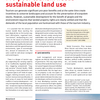Pro-poor tourism needs sustainable land use
Tourism can generate significant pro-poor benefits if social and environmental impacts are taken into account in developing a tourist destination. This includes both considering the carrying capacity of the tourist destination and ensuring that the local community benefits from the project as well. Observing landed property rights is just as important as the conservation of a destination's "natural capital". An ecosystem that works sustainably is a guarantor of tourism for the benefit of all that is successful in the long run.
Manuel Junck
Deutsche Gesellschaft für Internationale Zusammenarbeit (GIZ)
Sector Project "Tourism and Sustainable Development"
Eschborn, Germany
Manuel.Junck@giz.de
Sources for further reading:
AFD White Paper, September 2008: Land Governance and Security of Tenure in Developing Countries
The Economics of Ecosystems and Biodiversity (TEEB) for policy makers (D1) 2009, www.teeb.org
Blanco, Ester; Javier Rey-Maquieira; Javier Lozano 2009: Economic incentives for tourism firms to undertake voluntary environmental management, Tourism Management 30(1) 112-122.
Häusler, Nicole; José Fröhling 2008: Analysis of small and medium tourism enterprises and community-based tourism projects in six developing countries, Berlin and Eschborn.
Hardin, Garrett 1968: The Tragedy of the Commons, Science, 162: 1243-1248.
IUCN 2008: Briefing note 8
European Union (EU) Parliament and Council 2001: Directive 2001/42/EC of the European Parliament and of the Council, Official Journal of the European Communities, L 197/30.
Mitchell, Jonathan; Caroline Ashley 2010: Tourism and Poverty Reduction: Pathways to Prosperity, London.
Moscardo, Gianna: Sustainable tourism innovation: Challenging basic assumptions. Tourism and Hospitality Research (2008) 8, 4?13.
OECD Development Assistance Committee (DAC) 2006: Applying Strategic Environmental Assessment: Good Practice Guidance for Development Cooperation. DAC Guidelines and Reference Series, Paris.
Ostrom, Elinor 1990: Governing the Commons - The evolution of institutions for collective action, Cambridge 2005: Understanding Institutional Diversity, Princeton
Pritchett, Lant; Michael Woolcock (2008): Solutions when the solution is the problem: Arraying the disarray in development; in: William Easterly (Ed.) 2008: Reiniventing Foreign Aid, Cambridge, 147-177.
USAID 2006: Nature-Oriented Tourism in Ecuador - An Assessment Applying the Value Chain and Nature, Wealth and Power Frameworks.
United Nations Economic Commission for Europe (UNECE) 2003: Protocol on Strategic Environmental Assessment, Kiev.
World Bank 2001: An Environment Strategy for the World Bank, Washington DC.




